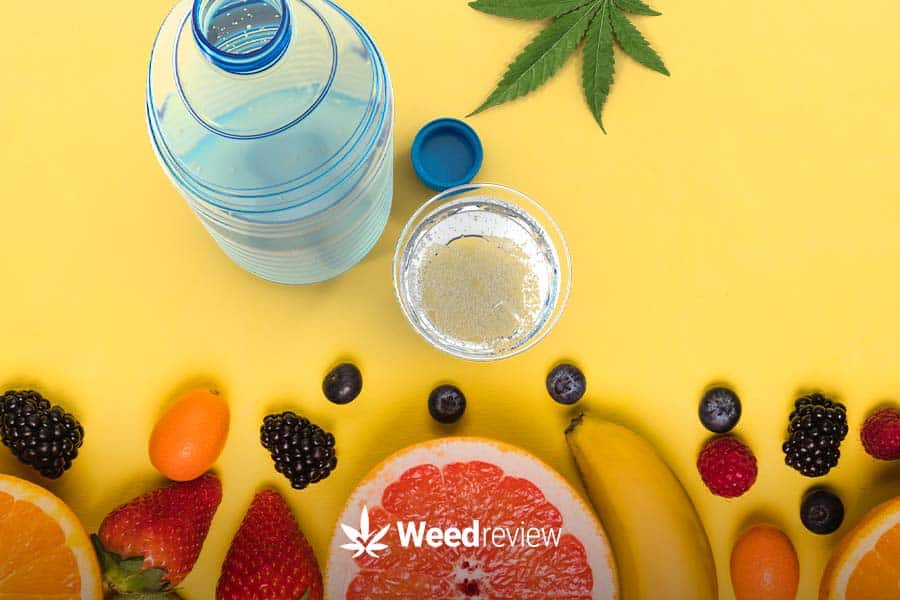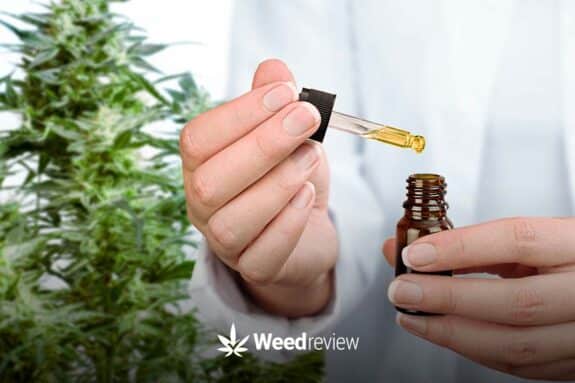
Cannabis Detox: How to Get Weed Out of Your Body, Withdrawal Symptoms

Table of Contents
In the world of legal cannabis, it’s crucial to understand the concept of cannabis detox and its relevance.
Whether you take marijuana for medical reasons or recreational, cannabis detox can play an important role in your journey towards wellness.
In this article, we will look at the ins and outs of marijuana detox, exploring its process & benefits, factors influencing it, withdrawal symptoms, and methods of detoxification.
What is marijuana detox?
Cannabis detox is the process of removing cannabis and its active compounds, such as THC (the psychoactive chemical in the plant), from the body. Its purpose is to restore a state of balance and clarity by removing marijuana entirely from the system.
Your body gets used to the presence of THC over time with chronic, heavy use. It becomes dependent on weed, leading to cannabis use disorder/cannabis addiction (yes, you can become addicted to weed).
While chronic cannabis use can lead to dependency and other health concerns, it's essential to recognise that in controlled, therapeutic doses, cannabis has been used effectively to manage a variety of medical conditions, from chronic pain to epilepsy.
This dependency on weed can have long-term effects that may not be good for your health. Some of these include breathing difficulties, addiction, effects on the brain (memory & intelligence), and problems with reproductive health and mental health.
That’s where cannabis detox comes in. It offers a path towards breaking free from the cycle of dependency and restoring your body to a state without weed.
Cannabis detox differs from other types of detoxification due to the specific focus on getting rid of cannabinoids and their metabolites. The body naturally metabolises and eliminates THC and other cannabinoids, but it is slow. A dedicated detox can speed up this process.
Why do cannabis detox?
There are several reasons why someone might choose to undergo a cannabis detox.
- Drug testing; detoxing is crucial to ensure they test negative for cannabis.
- Part of a lifestyle change to reduce the potential negative effects of prolonged cannabis use.
This process can have a life-changing impact. The biggest benefits include:
- Improved overall well-being as detoxification helps to restore the body’s natural balance and promotes a healthier lifestyle.
- Enhanced cognitive function, focus, and mental clarity
- Improved sleep is often reported following detox as the body adjusts to a more balanced state.
- Increased motivation and productivity are common outcomes, allowing individuals to pursue their goals with renewed energy.
- Opens up potential career opportunities that may have been previously restricted due to cannabis use.
Please note that the need for cannabis detox may vary depending on your use patterns.
If you are an occasional cannabis user, enjoying it only at parties or on rare occasions, your body will naturally remove the cannabinoids without the need for a specific detoxification process.
If you find yourself smoking cannabis every day, engaging in frequent use (3-5 times per week) or multiple times a day, it may be necessary to consider a weed detox.
Expected withdrawal symptoms during detox
Cannabis withdrawal syndrome (CWS) can occur during cannabis detox as the body adjusts to the absence of THC and other cannabinoids.
While the withdrawal experience can vary from person to person, there are some common symptoms associated with cannabis detox. These symptoms may include irritability, anxiety, sleep disturbances, nervousness, loss of appetite, fatigue & lethargy, decreased appetite, and mood swings.
The intensity and duration of withdrawal symptoms can differ for each person. It often depends on four key factors:
- Frequency of cannabis use, with daily, chronic smokers likely to experience most symptoms.
- The potency of cannabis; the stronger the weed, the higher the chances of withdrawal signs.
- Metabolism; how quickly the body can process and remove the cannabinoids.
- Body fat levels; THC is fat-soluble and tends to accumulate in fat tissues over time. People with a higher fat percentage might take longer to detox.
The symptoms tend to ease with time from the last cannabis use, with the first 2-3 weeks likely to be more challenging.
How to detox from cannabis
The detoxing process can be physically and emotionally demanding. Plenty of support from friends and family, the right help, and a strong determination contribute to the success of quitting marijuana.
There are things you can do yourself:
- Drink plenty of water to stay hydrated.
- Engage in regular exercise to promote metabolism.
- Do sauna therapy regularly to sweat out toxins.
- Maintain a healthy diet rich in fruits, vegetables, and fibre.
- Ensure you get sufficient sleep to aid in the body’s healing and restoration process.
- Take care of your mental health.
- Drink tea with high levels of antioxidants and liver-cleansing properties, like green tea, milk thistle, or dandelion tea.
- Eat foods rich in Omega-3s, like fish, flaxseeds, and chia seeds, as they can be beneficial during cannabis detox. Research suggests they help in rebuilding the endocannabinoid system, which is affected by cannabis use.
It is also suggested that you talk to a doctor beforehand or during the detox process if it becomes difficult for you.
Detox kits & drinks
In addition to natural detox methods, you will also find detox kits or similar products available in the market. These are products that may help speed the detoxification process. Popular options include shampoos, mouthwash, pills, drinks, vitamins, and supplements.
These items claim that they can remove THC & cannabinoids from your body quickly so you can pass the drug tests.
The detox kits often contain specialised formulas or supplements designed to support the detoxification process. However, it’s important to be careful here as these products may not be verified/approved/tested.
These detox kits won’t provide immediate detoxification, and they are not a miracle cure. The body naturally metabolises and flushes out THC, and these kits mainly aim to boost that natural process.
Keep in mind that the effectiveness and safety of detox kits can vary, and it’s better to consult with a doctor or trusted expert before adding them to your detox plan. Be aware of any potential side effects or interactions with other medications you may be taking.
Build a supportive environment
To support your cannabis detoxification process, consider the following:
- Avoid the reintroduction of cannabinoids into your system, thus allowing your body to focus solely on the elimination process. Do not consume cannabis during the detox period.
- Manage withdrawal symptoms effectively. Consider practising relaxation techniques such as deep breathing exercises or meditation, which can help reduce anxiety and promote emotional well-being.
- Make a support system of friends, family, and professionals help who can help you get through the detoxification & withdrawal symptoms.
Rehab
Apart from this, you may consider detox centres or rehabilitation facilities specialising in marijuana abuse treatment. These centres provide structured environments with professional care, medical supervision, and tailored counselling. They offer a safe space for detoxification with trained experts and doctors.
Therapy
Therapy or counselling is another valuable resource to explore. It provides a supportive and non-judgmental setting to address underlying reasons for cannabis use and develop effective coping strategies.
Therapies like Cognitive-Behavioral Therapy can be particularly useful, as they help in reshaping patterns of thinking and behaviour that contribute to heavy cannabis use. This psychological support is key, as it equips individuals with the tools to manage stress and triggers effectively, promoting long-term recovery and wellness.
Addiction-experienced therapists or counsellors can help also navigate psychological and emotional challenges during detox.
Friends & family
Surround yourself with friends and family who can support you in this journey and offer emotional support and encouragement.
Detoxing may not be an easy process at all, especially if you are coming off a long period of chronic use and dependency. That is why self-care is absolutely important.
Timeframe: How long does detox take?
THC can typically be detected in urine for up to 30 days after the last use, but this duration may be shorter for infrequent or light users. For heavy and chronic users, THC and its metabolites can potentially be detectable for longer periods.
If you are a one-time consumer, cannabis may stay in your body for 5-7 days before being completely flushed out.
The timeline for the elimination of THC from the body can vary based on several factors, including the frequency and intensity of cannabis use, metabolism, body fat percentage, hydration levels, and individual variations. You can learn more about how long weed stays in the body to get a clearer picture.
How marijuana detox works
When cannabis is consumed, THC is absorbed into the bloodstream and distributed throughout the body. The liver plays a vital role in metabolising THC into various byproducts, which are then further processed for removal. The kidneys also contribute to the detoxification process by filtering the byproducts and excreting them through urine.
As the body gets rid of THC and its metabolites, the detoxification process progresses. The duration of cannabis detox can vary depending on major factors:
- Frequency and duration of cannabis use: People who have been using cannabis regularly and for an extended period are likely to have higher THC levels stored in their body tissues, which can prolong the detox process.
- Metabolism: Metabolic rate varies among individuals and can affect how quickly the body flushes out THC.
- Body fat percentage: THC is fat-soluble and stored in fat cells. Higher body fat percentages can lead to a longer detox period, as THC is slowly released from fat stores.
- Hydration levels: Staying well-hydrated can support the body’s natural detoxification process, helping to flush out toxins more efficiently.
- Exercise habits: Regular exercise can help accelerate metabolism and fat burning, potentially aiding in removing THC from the body.
- Genetics: Genetic factors can play a role too, influencing the detoxification timeline.
Cannabis detox is not a one-size-fits-all process. These factors interact in complex ways, and individual differences can lead to varying detox experiences.
Conclusion
Starting a cannabis detox journey can bring various benefits, including improved overall well-being, mental clarity, better sleep, and increased motivation. By understanding the detox process and considering the factors that affect it, you can make informed decisions and take the necessary steps to support your detoxification goals.
Remember, each individual’s detox experience is unique, and it is important to find what works best for you.
For some, it may be easy, while for others (especially those who are frequent, daily users), it may be more challenging. If you are considering detoxing, speak to a doctor or addiction specialist who can provide personalised guidance and support throughout the process.


